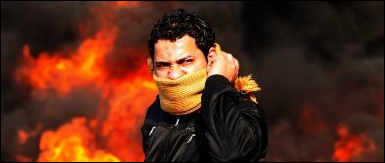http://sports.yahoo.com/sow/news?slu...ters&type=lgns
An Yong-hak was born in Japan, holds a North Korea passport and plays club soccer in South Korea, but the Suwon Samsung midfielder is a man without a country.
The wiry 30-year-old will fulfil a childhood dream when he marches on to the field with North Korea at next year’s World Cup finals, but he told Reuters in an interview on Thursday his heart belongs to a country that split in half some 60 years ago.
“My nationality is not North Korean, it’s Choseon. But it’s a country that doesn’t exist anymore,” said An.
“It’s a political issue so it gets a bit complicated, but I believe I’m part of the Choseon peninsula. I’ll represent North Korea at the World Cup … but I feel I’m also at home here in the South.”
‘Choseon’ is the term used by the North for the entire Korean peninsula, which was colonised by Japan in 1910. North and South Korea only emerged following their liberation after World War II and their relationship is a fragile one.
Sporting rivalry among the three Asian neighbours has a fierce quality forged in Japan’s brutal occupation of the peninsula and all three will travel to South Africa next year.
While Japan and South Korea are old hands at qualifying, the North have made it to their first World Cup finals since 1966, when they pulled off one of the biggest upsets in soccer by beating Italy to reach the quarter-finals.
An said qualifying for the 2010 tournament had been met with elation in the North.
“When we qualified for the World Cup finals the people lined the streets from the airport to Pyongyang, cheering the players’ motorcade,” he said.
“I watched it all on television,” added An, who returned to his base in Japan after helping the team to qualify with a 0-0 draw against Saudi Arabia in Riyadh in June.
An admits it will be hard for the current side to emulate those shock troops of 1966, who lost 5-3 to Eusebio’s Portugal after taking a three-goal lead in the quarters, but said they would also be no pushovers.
“I watched a DVD about our run to the quarter-finals in 1966 and saw how our players surprised the world. We want to do the same and surprise the world again.”
Educated in North Korean schools and college in Japan, An still found it tough to fit in when he was called up for the first time in 2006. His team mates were unsure what to make of a new team mate who spoke Japanese as his native language.
“I definitely didn’t feel welcome,” he said of those frosty first introductions.
“The coaches and manager didn’t know me and they just stood back and watched like they were testing me, judging what kind of player I was.”
The combative six-footer did not take long to impress, however, and says he is now greeted with warm welcomes instead of icy stares.
An also appears at ease with his life in capitalist South Korea, and clearly enjoys all Seoul has to offer.
He married his high-school sweetheart, drives a top-of-the-line Samsung car and lights up when talking about his hopes of playing in the English Premier League.
He only visits North Korea on national team duty and has few connections with the country outside of his political beliefs.
“Even after my soccer career is over I don’t think I will be living in North Korea,” he mused. “I have never lived there and don’t have a home there.”
Where exactly is home for An?
“Choseon,” he replies. A country that doesn’t exist.
Can you imagine him and his nationality being introduced in Iran? Aghaye An Chosi hastand!
An Yong-hak was born in Japan, holds a North Korea passport and plays club soccer in South Korea, but the Suwon Samsung midfielder is a man without a country.
The wiry 30-year-old will fulfil a childhood dream when he marches on to the field with North Korea at next year’s World Cup finals, but he told Reuters in an interview on Thursday his heart belongs to a country that split in half some 60 years ago.
“My nationality is not North Korean, it’s Choseon. But it’s a country that doesn’t exist anymore,” said An.
“It’s a political issue so it gets a bit complicated, but I believe I’m part of the Choseon peninsula. I’ll represent North Korea at the World Cup … but I feel I’m also at home here in the South.”
‘Choseon’ is the term used by the North for the entire Korean peninsula, which was colonised by Japan in 1910. North and South Korea only emerged following their liberation after World War II and their relationship is a fragile one.
Sporting rivalry among the three Asian neighbours has a fierce quality forged in Japan’s brutal occupation of the peninsula and all three will travel to South Africa next year.
While Japan and South Korea are old hands at qualifying, the North have made it to their first World Cup finals since 1966, when they pulled off one of the biggest upsets in soccer by beating Italy to reach the quarter-finals.
An said qualifying for the 2010 tournament had been met with elation in the North.
“When we qualified for the World Cup finals the people lined the streets from the airport to Pyongyang, cheering the players’ motorcade,” he said.
“I watched it all on television,” added An, who returned to his base in Japan after helping the team to qualify with a 0-0 draw against Saudi Arabia in Riyadh in June.
An admits it will be hard for the current side to emulate those shock troops of 1966, who lost 5-3 to Eusebio’s Portugal after taking a three-goal lead in the quarters, but said they would also be no pushovers.
“I watched a DVD about our run to the quarter-finals in 1966 and saw how our players surprised the world. We want to do the same and surprise the world again.”
Educated in North Korean schools and college in Japan, An still found it tough to fit in when he was called up for the first time in 2006. His team mates were unsure what to make of a new team mate who spoke Japanese as his native language.
“I definitely didn’t feel welcome,” he said of those frosty first introductions.
“The coaches and manager didn’t know me and they just stood back and watched like they were testing me, judging what kind of player I was.”
The combative six-footer did not take long to impress, however, and says he is now greeted with warm welcomes instead of icy stares.
An also appears at ease with his life in capitalist South Korea, and clearly enjoys all Seoul has to offer.
He married his high-school sweetheart, drives a top-of-the-line Samsung car and lights up when talking about his hopes of playing in the English Premier League.
He only visits North Korea on national team duty and has few connections with the country outside of his political beliefs.
“Even after my soccer career is over I don’t think I will be living in North Korea,” he mused. “I have never lived there and don’t have a home there.”
Where exactly is home for An?
“Choseon,” he replies. A country that doesn’t exist.
Can you imagine him and his nationality being introduced in Iran? Aghaye An Chosi hastand!






Comment